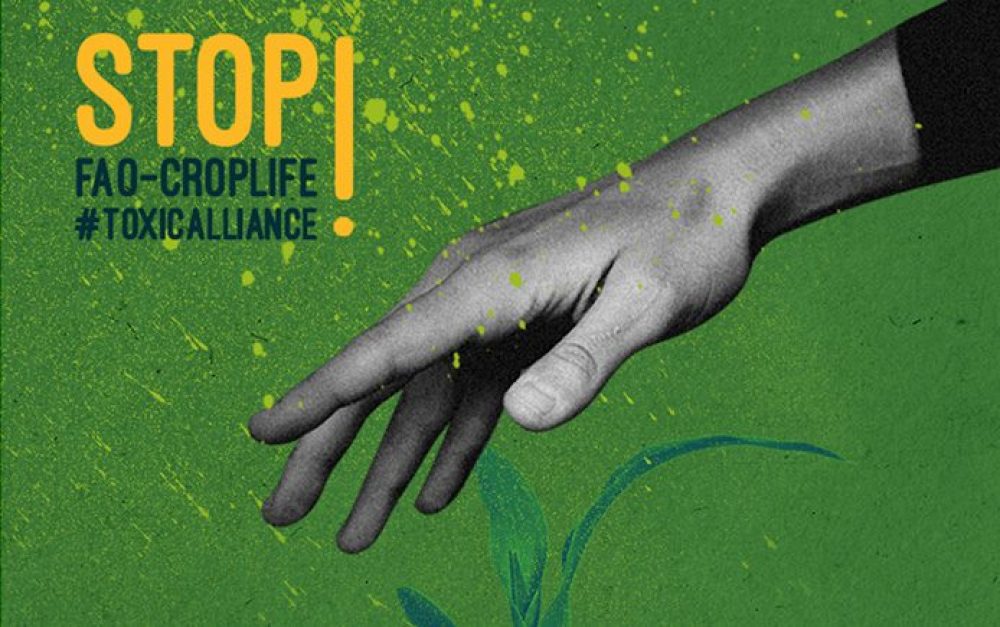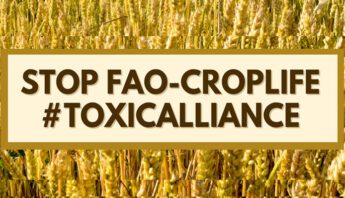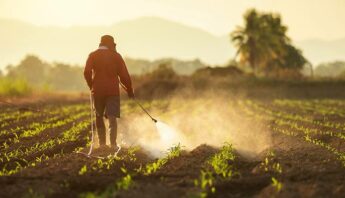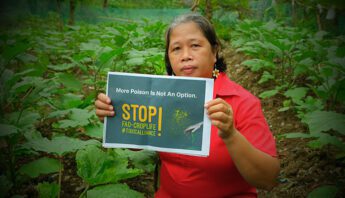Greetings from the PAN International Team,
I’m excited to share with you that we just reached a big milestone in our campaign to Stop the #ToxicAlliance between United Nations Food & Agriculture Organization (FAO) and pesticide industry association CropLife International!
Last week, PAN submitted a letter to Member States of the FAO’s Council signed by 430 civil society and Indigenous Peoples organizations from 69 countries across the globe! The letter called on the FAO Council to rescind the agency’s partnership with CropLife International, which represents the world’s largest pesticide manufacturers including BASF, Bayer, Corteva, FMC and Syngtenta.
In addition to the letter, PAN submitted a briefing report to FAO Member States detailing the ways that this partnership is a conflict of interest for FAO, and incompatible with human rights protected by the UN.
This builds on our organizing momentum of the past year, including December’s Global Day of Action when we submitted a petition to FAO’s Director-General signed by over 187,300 individuals from more than 107 countries urging an immediate end to the partnership. Our demands were echoed by the UN Special Rapporteur on the Right to Food, namely: “to review the agreement with CropLife International with an eye to human rights concerns” and “to consider directing the Director-General of FAO to rescind the agreement.”
In this moment of increasing corporate capture of our food systems and amidst rising food crises, we are bringing the voices of small farmers, agricultural workers, activists, and communities around the world directly to the FAO’s leadership — demonstrating massive global opposition to the #ToxicAlliance.
Read more about these exciting updates below. Thanks for being a part of the PAN community! Wishing you good health.
Simone Adler
Organizing Co-Director, International & National Teams
Co-Coordinator of the Stop the #ToxicAlliance Campaign
430 civil society and Indigenous Peoples groups to FAO Council: End partnership with pesticide industry
Ahead of the FAO Council’s 170th session that began on June 13, PAN submitted to members of the Council a letter co-sponsored by 10 other global networks on behalf of 430 organizations from 69 countries, urging Member States to take immediate action in the Council session and rescind the agency’s partnership with CropLife International.
The letter details how the use of hazardous pesticides is inconsistent with many human rights protected by the UN, and undercuts the FAO’s and several Member States’ support for agroecology. It asserts that the FAO deepening its collaboration with CropLife International directly counters any efforts toward progressively banning Highly Hazardous Pesticides, for which CropLife member companies make over 35% of their sales.
We chose to elevate our campaign demands to the FAO Council because of their role in enacting and promoting policies to reduce reliance on toxic pesticides. We are watching closely and demanding they take seriously the major concerns of civil society, Indigenous Peoples, farmers, agricultural workers, and other communities, to not allow the FAO to continue its partnership with CropLife through any means.
Read the full letter here, and our Press Release here.
Briefing to FAO Member States: “Addressing the Conflict of Interest and Incompatibility of FAO’s Partnership with CropLife International”
Along with the letter to the FAO Council, PAN also sent Member States a 4-page briefing report detailing the ways CropLife International is an incompatible partner for the FAO. The briefing was submitted by PAN and the 10 other organizations in our Stop the #ToxicAlliance campaign.
Member States are given concrete recommendations for what they can do right now to end the FAO-CropLife partnership. The briefing details the specific human rights that hazardous pesticides are inconsistent with, from the right to health, to the right to safe working conditions, to the rights of Indigenous Peoples in rural areas.
The briefing cites examples of CropLife member companies’ influence on national policy and scientific data, and details the ways this partnership undermines FAO’s own Code of Conduct on Pesticide Management, and its commitments to reducing reliance on pesticides. It also argues that partnering with pesticide companies causing egregious pesticide poisoning and environmental destruction undercuts the FAO from leading efforts to support agroecology. It asks the question:
“Recognizing CLI’s vested interest in maintaining, if not increasing, its profits from the continued sale of HHPs, how can we expect CLI to support efforts to reduce farmers’ reliance on its products? This is counter to their business, yet it is, according to FAO’s guidance, the first and most important step in preventing and reducing risk.”
This briefing is one of the many ways we have been increasing pressure on the FAO, the UN agency mandated to support farmers and rural workers. In May, our coalition of 11 global networks sent a letter to the FAO’s Program Committee ahead of their meeting with our concerns. And in March, we submitted an official intervention in the 49th UN Human Rights Council session uplifting the Special Rapporteur on the Right to Food’s recommendations that this partnership be seriously reconsidered. Watch the 1.5 min video here!
New report: Corporate Capture of FAO
Last week, a new report was published that exposes the extent of FAO’s engagement with the corporate sector and its negative impact on global decision-making at a time of worsening food crises.
The report was produced by Corporate Accountability and FIAN International, with contributions from PAN International and PAN North America, both authored by yours truly, with editing from my co-coordinator of the campaign, PAN Asia Pacific’s Ilang Quijano, and reviewing from PANNA International Team member Marcia Ishii.
The report includes three case studies of FAO’s current partnerships, including with CropLife International. In that study, we point out the inconsistencies in how the FAO refers to it as both a formal and an informal engagement, and the lack of transparency regarding whether or not a proper risk assessment was conducted.
Ultimately, the report argues that the FAO’s new approach to the private sector allows for engagements with high-risk industries, including agrichemicals, to move forward. As I stated in our Press Release for the report:
“FAO’s new framework for assessing risks with the private sector has its limitations. The Organization has made it clear in its new Strategy for Private Sector Engagement that it is taking a pro-business ‘proactive approach’ that seeks merely to manage risks, a concerning shift from its previous ‘defensive’ approach of avoiding risks altogether. Despite a new process that should ensure all potential partnerships are assessed against important social and environmental criteria and for adherence to UN treaties to protect human rights, the approach taken under the new Director-General’s leadership raises grave concerns for small scale farmers, food producers, agricultural workers and communities worldwide.”
The corporate takeover of UN institutions like the FAO threatens the democratic governance of our food systems. We won’t stop our organizing — we need the FAO to Stop the #ToxicAlliance!
To view this update on your browser or share on social media, click here.








